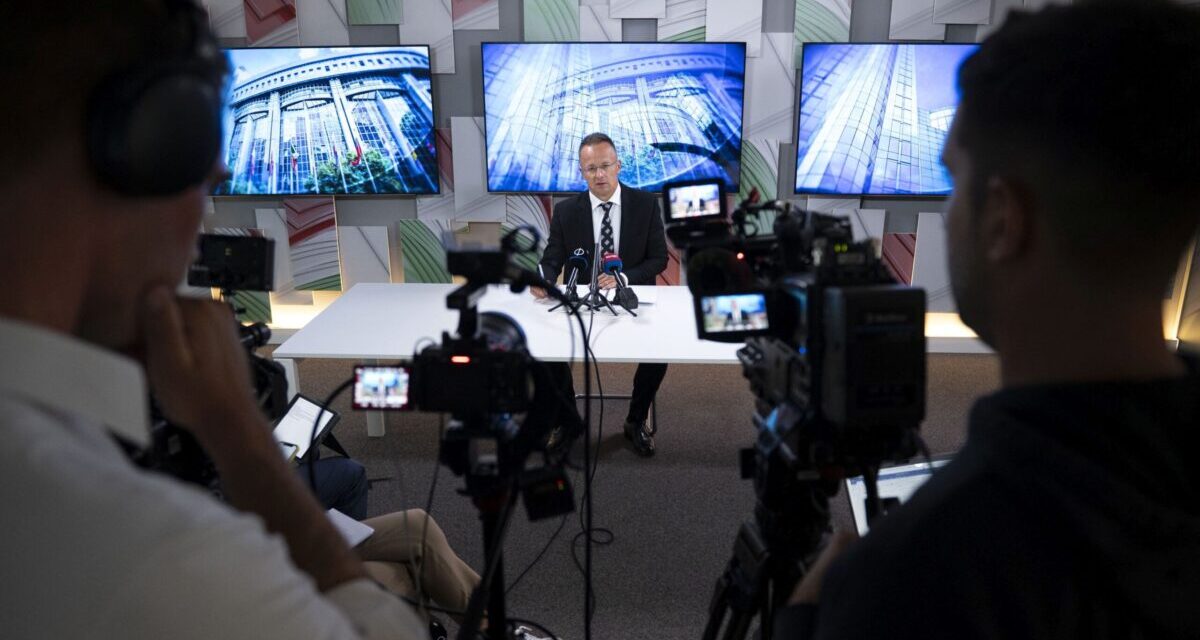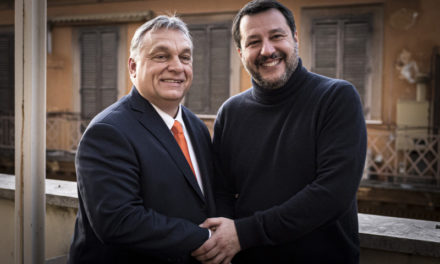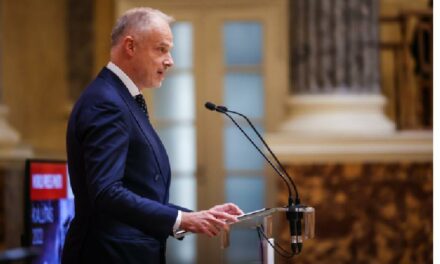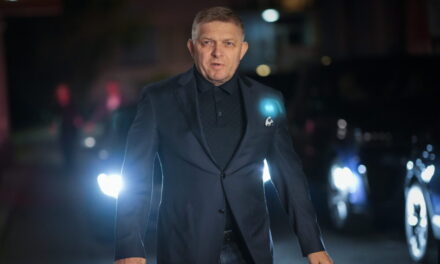Ukraine threatens the national security of Hungary and Slovakia by preventing the transit of Russian Lukoil's crude oil, and the European Commission has done nothing in the matter, Minister of Foreign Affairs and Trade Péter Szijjártó announced on Thursday in Brussels.
According to the statement of the Ministry of Foreign Affairs and Trade, the head of the department announced at the press conference following the informal meeting of the European Union's foreign affairs council that his Ukrainian colleague also participated in the meeting, who spoke emphatically about the Russian attacks on his country's energy system.
"The Hungarian position here is clear. A country's energy supply is a matter of national security. Therefore, if a country's security of energy supply is threatened by another country, it also threatens the national security interests of the targeted country," he stated.
"And it is exactly the same now with regard to Ukraine and Hungary. Because Ukraine is undermining the security of Hungary's energy supply or at least posing significant challenges to it, by making about a third of Hungarian oil imports from Russia practically impossible through legal means," he warned.
He went on to say that the same applies to Slovakia, where about 40-45 percent of Russian oil imports are being blocked by Ukraine.
And it must be said that the European Commission has been exposed, because either the European Union is so weak that it cannot protect the energy security of two member states against a non-EU member state, or it invented all of this on its own, and it was from Brussels that Kiev was ordered to do this by the Hungarian and to a step limiting Slovak energy security, he declared.
According to Péter Szijjártó, whichever is true, "it is quite disappointing that either the European Union is so weak, or that they hide behind Kiev in such a shameless way and try to force the Hungarian and Slovak pro-peace position to change".
He emphasized that both he and his Slovak colleague expressed their disappointment with the European Commission's procedure, and also reminded that both countries contribute significantly to the security of Ukraine's supply.
"42 percent of Ukrainian electricity imports currently arrive in Ukraine via Hungary, and Hungarian state-owned companies have made significant investments in order to ensure that the European and Ukrainian grids can operate in a synchronized manner," he pointed out.
"Without all these measures, Ukraine's electricity supply would not be secure. And despite this, we had to face the fact that Ukraine is messing with the security of both Hungarian and Slovak energy supplies," he added.
The minister then also reported that negotiations are ongoing with the Russian suppliers and the Ukrainian system operator on what kind of legal solution could be used to guarantee long-term supply.
But I'll say it again, this shouldn't be a task for us, but either the Ukrainians should restore the original state, or the European Union should act on this issue, he said.
He went on to explain that until now it has been possible to ensure the supply in the short and medium term with all kinds of temporary means, but in the case of energy, only the long-term solution is acceptable.
Therefore, of course, we continue to negotiate, and we hope that soon agreements can be signed that will help the long-term existence of energy supply security, he said.
Szijjártó also spoke about how Josep Borrell, the European Union's High Representative for Foreign and Security Policy, had completely lost control and made extremely dangerous and unreasonable proposals regarding the Middle East.
"Josep Borrell has apparently lost control and is coming and going here like the Biden of Brussels, making proposals that are extremely dangerous for Europe," said Szijjártó, who also criticized the High Representative's recent proposal, according to which the European Union should impose sanctions on Israel against two government ministers.
It is an extremely dangerous and absolutely unreasonable proposal, since such a decision would raise extraordinary questions in the Middle East and would completely undermine the cooperation between the European Union and Israel, he said.
He then praised Israel for agreeing with the World Health Organization (WHO) on the initiation of the polio vaccination program in Gaza.
"This step should be appreciated. Here today, they wanted to adopt a joint position that would have whipped Israel despite this agreement, so we asked for its amendment," he informed.
He also welcomed Israel's commitment to maintaining freedom of religion on the Temple Mount and the holy places.
"Certain actions of certain Israeli politicians in the recent period have caused concern in the Muslim and some Christian communities. And from this point of view, the public commitment of both the Israeli foreign minister and the prime minister to maintaining the freedom of religious practice, I think, is of great importance," he said.
Péter Szijjártó also touched on the fact that the head of Turkish diplomacy also participated in the meeting, and in this regard he complained that there had not been such a high-level consultation between the EU and Turkey for five years, as was the case under the Hungarian presidency.
He called the preservation of migration cooperation extremely important and made it known that he asked his Turkish colleague that "they should not allow themselves to be dissuaded from keeping migration under control just because they see that a European Union member state is obliged to pay tens and hundreds of millions of forints to pay, because it protects its borders".
Also, he said that he did not hold bilateral talks with the Turkish Foreign Minister, as they can do so at any time and will do so at the UN General Assembly in September.
He added: Turkey is indispensable in dealing with the challenges facing the European Union, be it energy security or physical security through migration.
The minister explained that the stabbing in Germany at the weekend also clearly demonstrated "how dangerous and irrational the pressure from Brussels is that they are trying to exert on Hungary as well".
"We don't want Solingen in Hungary, we don't want stabbings in Hungary, we don't want illegal migrants in Hungary, so it is quite simply shocking and outrageous that while the number of crimes committed by illegal migrants in Europe increases dramatically, the number of European people killed by illegal migrants increases, until the European Union is punishing us because we defend ourselves, our border, and do not allow illegal immigrants in," he listed.
Cover photo: Brussels, August 29, 2024.
Péter Szijjártó, Minister of Foreign Affairs and Trade, holds a press conference after the informal council meeting of EU foreign ministers at the Brussels center of public media on August 29, 2024.
Source: MTI/Boglárka Bodnár













